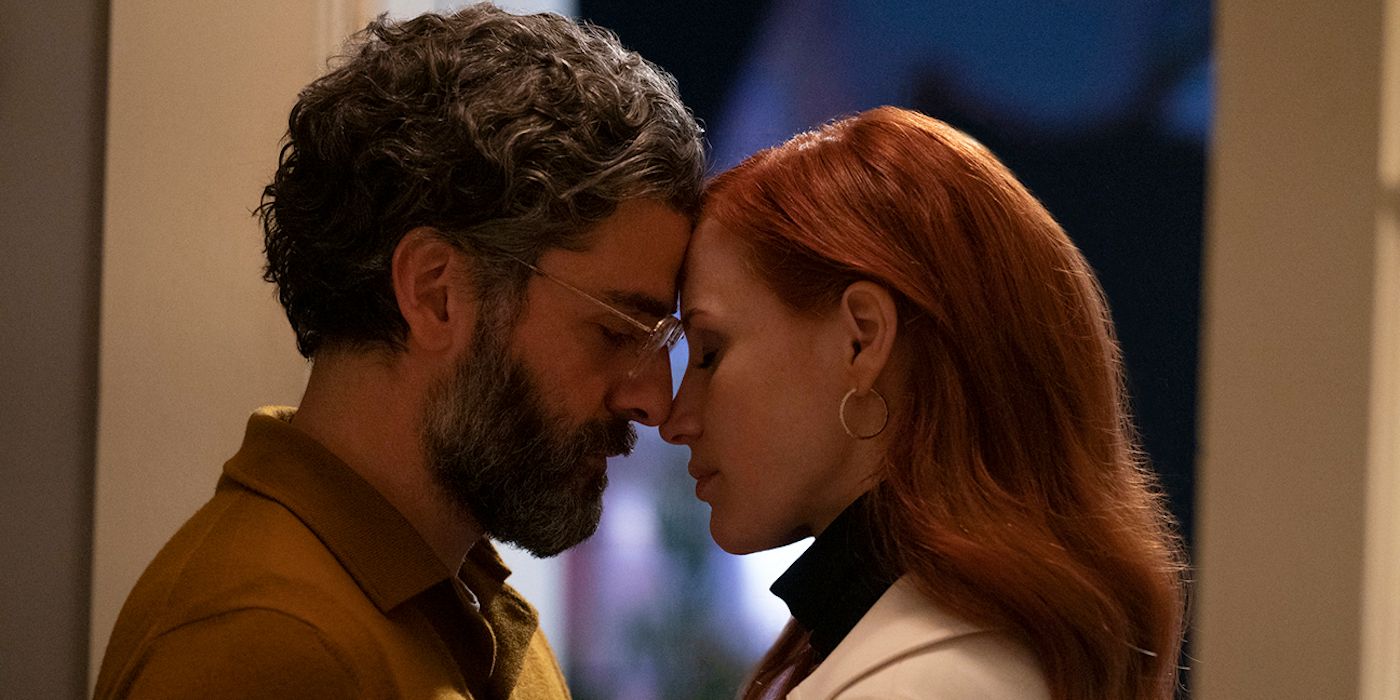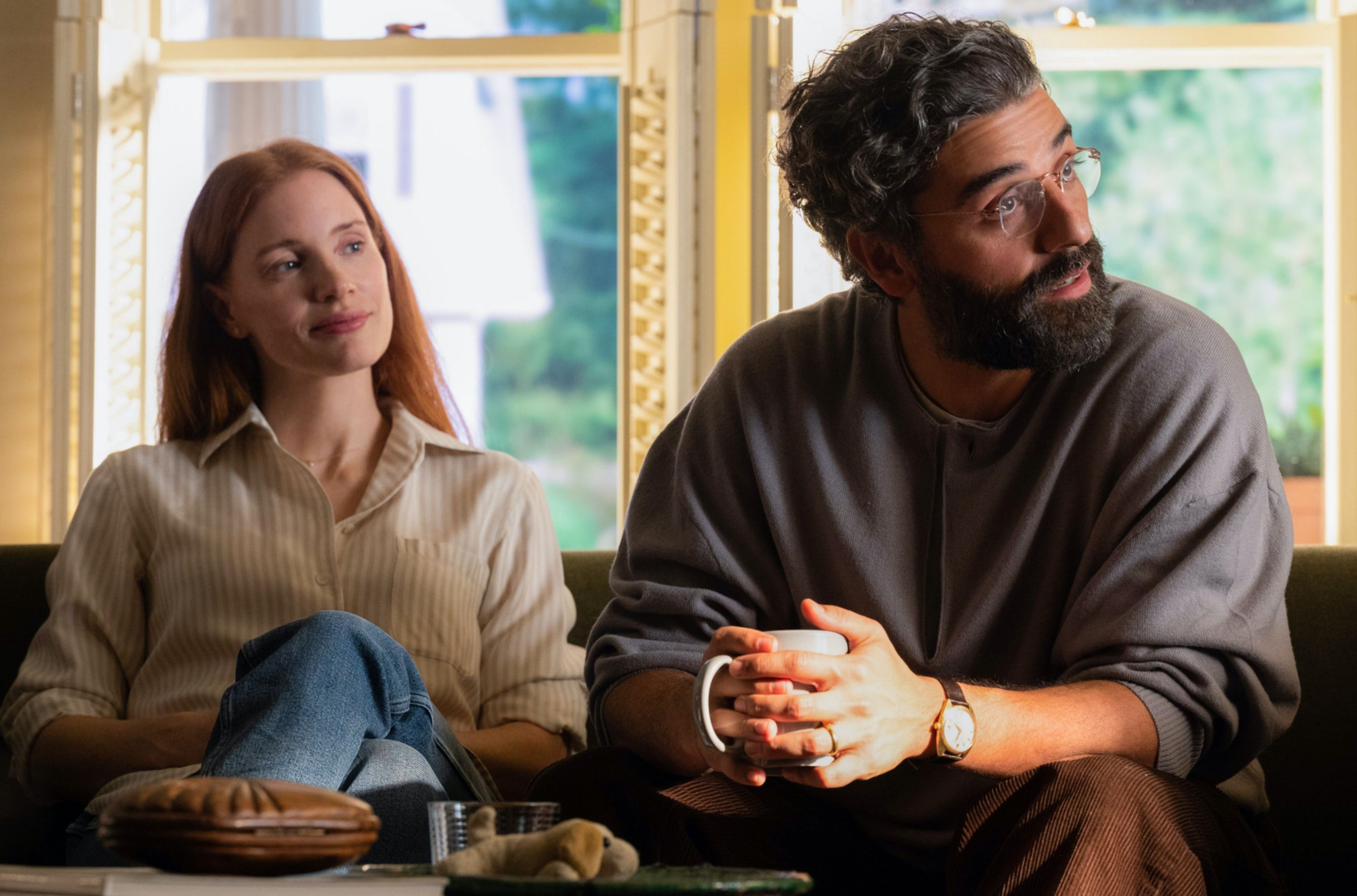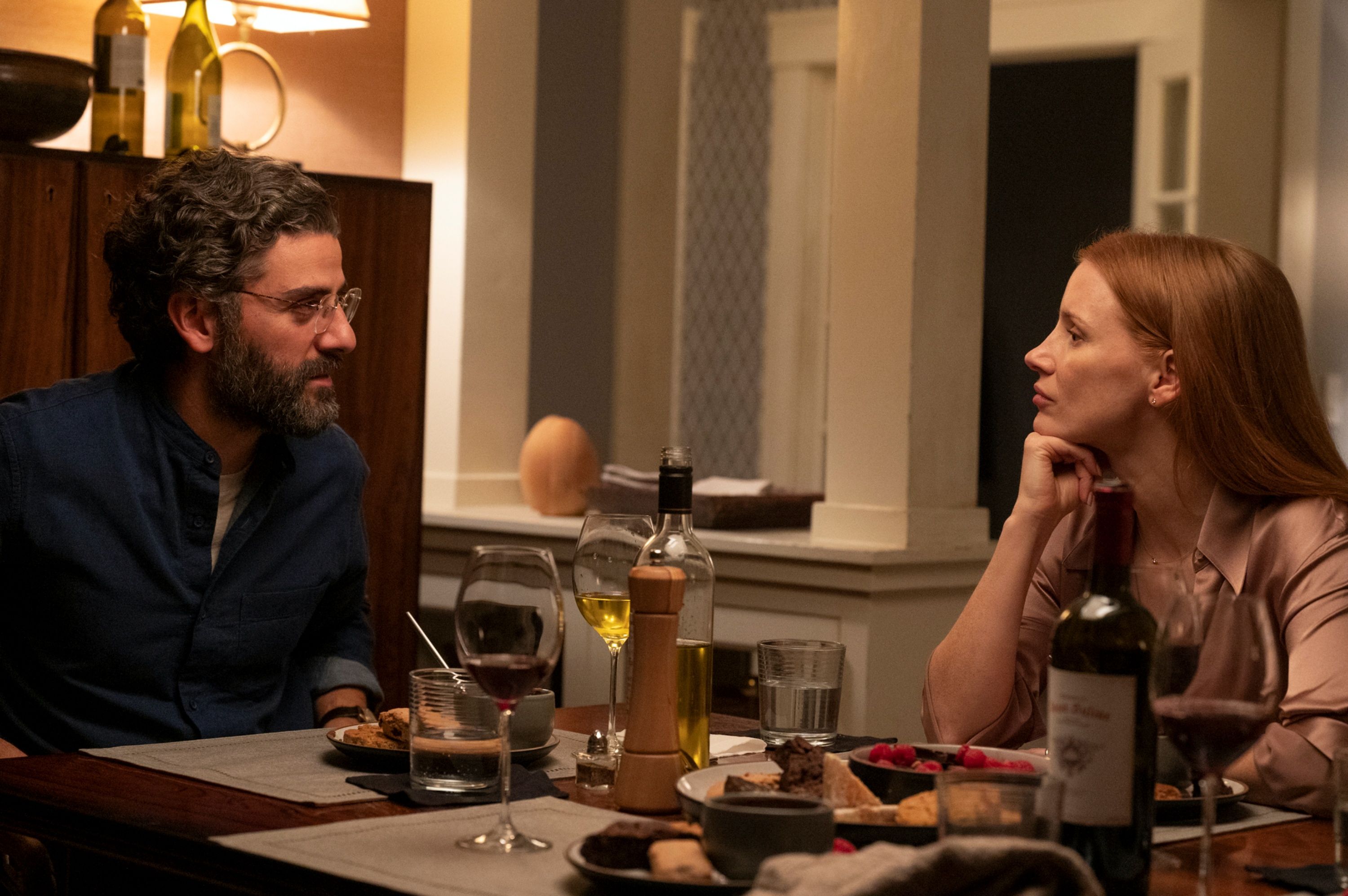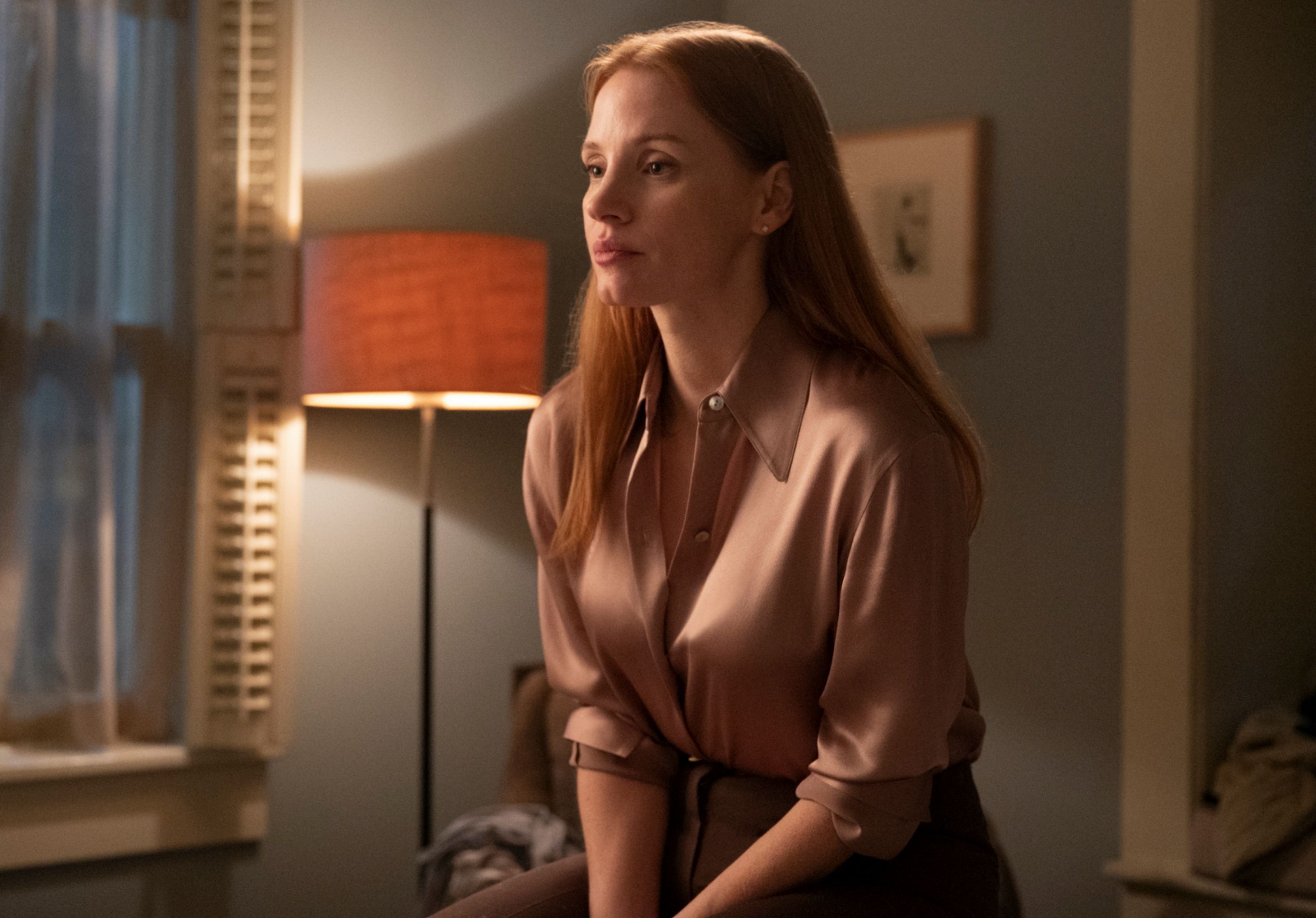From Hagai Levi (The Affair, In Treatment) and adapted from the Ingmar Bergman classic Swedish series, the HBO limited series Scenes from a Marriage examines marriage, monogamy and divorce as it follows Mira (Jessica Chastain), an ambitious career woman who is feeling unfulfilled, and Jonathan (Oscar Isaac), a philosophy professor trying to keep their relationship intact. As individuals, they both view that relationship very differently, but they also both realize that there isn’t one thing that will tear them apart, lead them to heal, or help them figure out what’s next.
During a roundtable interview with a couple other media outlets, co-stars Chastain and Isaac talked about the benefit of having a behind the scenes glimpse prior to the start of each episode, shooting during COVID, being each other’s acting coaches throughout the series, how the roles within the marriage become swapped, and the similarities with their relationship in A Most Violent Year.
Question: We’re reminded at the beginning of each episode that you shot this during COVID, which must have impacted the level of emotional and moral support you guys felt from the crew with them being in masks and keeping a distance from everyone. Did that make your own history with each other, as friends and as previous co-stars, even more important? In what ways did each of you feel most supported by each other, throughout this?
JESSICA CHASTAIN: We would joke to each other that we were each other’s acting coaches. There would be certain scenes. For me, it was in Episode 5, there was a scene where I was like, “I just don’t get it. I just don’t understand anything she’s saying.” I couldn’t remember the dialogue. It was before we went to shoot it. I just had so much trouble with the lines. And usually, when you can’t remember the lines, it’s because you don’t know what you’re doing. So, Oscar and I sat in my room and we went through everything, and he was my acting coach. Not in telling me, “You should do it like this,” but he was asking me questions that helped me find it. And that had happened previously, with other stuff as well. So usually, when one of us was pushing against a scene, it wasn’t that the scene was wrong. It’s just that we helped each other understand why we were personally pushing against it, and maybe that makes it more interesting to explore.
OSCAR ISAAC: Yeah, and she had done the same for me, many, many times before that, and a couple of times in particular. And then, as far as the crew, it’s true, the fact is that it was right in the midst of the pandemic and it was pre-vaccine and there was a lot of fear around that. There was this really beautiful thing that happened when we finished the last day of shooting, where (showrunner) Hagai [Levi] had asked any crew members that were comfortable with it and we all sat in a big circle, and each crew member would come into the middle of the circle and do this little striptease and take their mask off and show everyone their face. Everyone would just scream and clap because it was the first time that we had seen what their face looked like in five months. It was just a very bizarre, beautiful moment there, where you just realized, “Wow, we’re really living in a very singular time,” where that became such an emotional moment of getting to see these people we’d been working with for so long, for the first time.
I really loved how the show is framed, where you guys go from preparing for the scenes that are about to happen and into them without pause. It was very interesting, from an acting standpoint, how to see how you prepared for the scenes, as we’re about to see them. How did that help or frame how you guys were approaching these roles, going from the setup into that actual scene?
CHASTAIN: What’s incredible is that wasn’t in the script. I joined onto this project very late into the process, and the only reason I would ever do that is because of Oscar, to be honest. I knew that was my safety net. Once I joined, three days later, we were in rehearsal. Because we have such a similar way of working, and we’ve been friends for over 20 years, there’s a trust that is stronger than anyone I’ve ever worked with. Hagai saw that in our rehearsals. He saw the way that we were working, almost like we were approaching things like one character. We were telling the story of a relationship. It wasn’t ego-driven, with each person fighting for their role. It was something where we were constantly working in tandem. And when he saw that, he brought it up to us one day and he said, “I wanna break the fourth wall.” We were confused with what that meant, but then we were like, “Okay, well, let’s try it. If it’s bad, it won’t go in. But if it’s great, it’ll work.” And I’m so glad that he tried it because I really think it’s genius. When I watch it, it helps remind me, “Okay, this is the work that goes into it. This is Oscar and Jessica, and these are the scenes of this marriage of Mira and Jonathan.
ISAAC: It’s a strange thing that somehow, pointing out the artifice of it, it allows you to get even closer to it because we’re not trying to sell you anything. This was in the middle of COVID and this was us trying to figure out how to tell this story about this marriage, and we let you into that. In a way, it allows for an even deeper intimacy.
Jessica, at the beginning of this, your character, Mira, describes marriage as being like an equilibrium. Do you believe the irony is lost on them, that they swap roles in this marriage?
CHASTAIN: I think it’s absolutely lost on them. I don’t think they’re even conscious of it because it’s more of an animalistic state. But both times, they’re not really communicating from a clear place. The trauma of what happens in Episode 2 is not really a place that you can communicate from, and same with Episode 4. Mira has had a very difficult past month. Something that she fought so hard for, at the end of Episode 1, she’s now saying, at the end of Episode 4, “I’ll do it all. I’ll do whatever you want.” It’s sad to see her give up something that she had fought for. When I see Mira at the beginning, in Episode 1, and I see her in Episode 5, I see her happier in Episode 5. I see her as someone who is able to love, but also able to love herself and able to be fully who she is. Whereas in Episode 1, she’s muted part of herself. She’s made herself smaller in the house. It actually makes me quite happy to see that there’s this beautiful love story. In some sense, as much as it is a love story of how much she loves Jonathan, it’s also a love story of how much she loves herself.
ISAAC: Yeah, the irony is lost on him, for sure. I think he’s not operating necessarily from a place of strength, in Episode 4. Sure, there’s elements that feel like, “Yes, finally, you’re standing up for yourself,” but it’s not necessarily standing up for himself because he knows the person that he wants to be. I think he’s still quite lost, and in a way, his journey is one of becoming more comfortable with being lost. That’s the first leg of it. We don’t get to see the next leg, where he finds himself. This is just realizing that you’re a total stranger to yourself, and then letting yourself really be who you are and coming to terms with the fact that you’ve been wrong about everything. That’s part of his journey.
There are some similarities between your relationship in Scenes from a Marriage and your relationship in A Most Violent Year, where it feels like Jessica’s character is frustrated by something that Oscar’s character won’t do. How much of that comes from assimilation or the desire to assimilate?
ISAAC: Abel in A Most Violent Year had this idea of what the straight and narrow is and what being a businessman in the United States in New York is. But with Jonathan, it’s less about being more American and more about being a secular human being, coming from a very specific religious background and a tight-knit community, and then entering a world that’s totally foreign for him and that he’s been told will only lead to sadness and horror. The irony being that the horror stories that he’s been told about, “If you leave your community, you’re gonna wander alone,” and then his worst fear is coming true. So, yeah, there is definitely an element of this fish out of water, trying to adapt to the situation and putting on a role and playing a role that he’s not totally comfortable with.
CHASTAIN: With Mira, I think it’s the same thing, in the beginning of the relationship. When they come together and they talk about who they were when they met, her ex-boyfriend was a rock star and she was traveling around the world, doing drugs and doing all of this crazy stuff. She was so out there and so expansive in her life, and Jonathan was so small in his life. And they met, and then they tried to fit into these roles that they thought they were supposed to be. Mira made herself much smaller, as the wife. In fact, in the very beginning, when the college student says, “Define your role and who you are,” one of the very first things Mira says is, “I’m a wife.” Jonathan never says, “I’m a husband.” So, in some sense, they’re trying to be the opposite of the world that they came from.
Scenes from a Marriage airs on Sunday nights on HBO.




